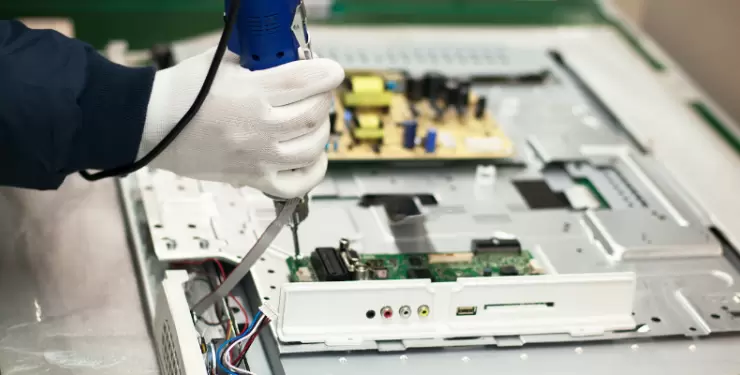Industrial Electronics
Industrial electronics refers to the application of electronic devices, systems, and technologies in industrial settings to automate processes, monitor operations, and control machinery and equipment. This field encompasses a wide range of applications, including manufacturing, process control, automation, robotics, instrumentation, and monitoring systems. Industrial electronics plays a critical role in enhancing productivity, efficiency, safety, and reliability across various industries.
Industrial electronics involves the use of electronic components, devices, and systems to perform tasks such as sensing, processing, controlling, and monitoring within industrial environments. These environments can include factories, refineries, power plants, warehouses, assembly lines, and other industrial facilities. Industrial electronics systems are designed to withstand harsh environmental conditions, such as temperature variations, humidity, dust, and vibration, while reliably performing their functions.
Applications:
1. Manufacturing Automation: Industrial electronics are widely used in manufacturing processes to automate production lines, control machinery, and optimize workflows. Automated systems can perform tasks such as material handling, assembly, packaging, and quality control with high precision and efficiency.
2. Process Control: In industries such as chemical processing, oil and gas, pharmaceuticals, and food and beverage, industrial electronics are used for process control and monitoring. Sensors, controllers, and actuators are employed to regulate variables such as temperature, pressure, flow rate, and chemical composition to ensure product quality and safety.
3. Robotics: Industrial robots are equipped with electronic control systems that enable them to perform tasks such as welding, painting, assembly, material handling, and inspection in manufacturing environments. Industrial robots improve productivity, accuracy, and flexibility while reducing labor costs and cycle times.
4. Instrumentation and Measurement: Industrial electronics systems include instruments and sensors for measuring parameters such as temperature, pressure, humidity, level, position, and flow. These measurements are essential for monitoring processes, detecting abnormalities, and maintaining optimal operating conditions.
5. Power Electronics: Power electronic devices and systems are used for motor control, power conversion, voltage regulation, and energy management in industrial applications. They enable efficient and reliable operation of electrical machinery, drives, inverters, converters, and uninterruptible power supplies (UPS).
6. Data Acquisition and Control: Industrial electronics systems integrate data acquisition devices, programmable logic controllers (PLCs), distributed control systems (DCS), supervisory control and data acquisition (SCADA) systems, and human-machine interfaces (HMIs) for real-time monitoring, control, and visualization of industrial processes.
Industries Served:
Industrial electronics find application across a wide range of industries, including:
1. Manufacturing: Automotive, aerospace, electronics, consumer goods, machinery, textiles, and pharmaceuticals.
2. Energy: Oil and gas, power generation, utilities, renewable energy, and nuclear.
3. Chemicals: Petrochemicals, refineries, fertilizers, and specialty chemicals.
4. Food and Beverage: Food processing, breweries, distilleries, and dairy.
5. Metals and Mining: Steel, aluminum, mining, and mineral processing.
6. Utilities: Water and wastewater treatment, irrigation, and distribution networks.
7. Transportation: Railways, ports, airports, logistics, and distribution centers.
Target Areas and Considerations:
1. Reliability: Industrial electronics systems must be highly reliable to ensure uninterrupted operation and prevent costly downtime in industrial processes.
2. Safety: Industrial electronics must comply with stringent safety standards and regulations to protect workers, equipment, and the environment from hazards and accidents.
3. Scalability: Industrial electronics solutions should be scalable to accommodate changes in production volumes, process requirements, and technological advancements.
4. Integration: Industrial electronics systems often need to integrate with existing infrastructure, legacy equipment, and enterprise systems to enable seamless communication and interoperability.
5. Maintenance: Industrial electronics systems require regular maintenance, calibration, and troubleshooting to ensure optimal performance and longevity.
Industrial electronics play a pivotal role in driving automation, efficiency, and productivity in various industries worldwide. With advancements in technology, including the Internet of Things (IoT), artificial intelligence (AI), and machine learning, the role of industrial electronics is expected to continue evolving, enabling smarter, more connected, and more efficient industrial operations. As industries embrace digital transformation and Industry 4.0 initiatives, the demand for innovative industrial electronics solutions will only continue to grow.

